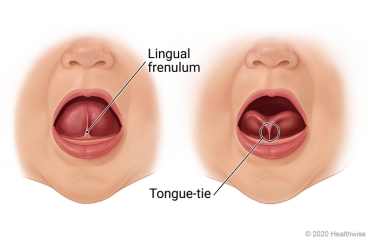
Overview
In tongue-tie, the tissue that connects the tongue to the bottom of the mouth is too short. This problem often runs in families.
Your child may not be able to fully move their tongue. But this may not cause problems. In some cases, the tissue stretches as the child grows. Or your child may adapt to less tongue movement.
Some children have trouble latching while breastfeeding. They may have speech and social problems. If symptoms are bad enough, surgery may be needed to release the tissue.
Follow-up care is a key part of your child's treatment and safety. Be sure to make and go to all appointments, and call your doctor if your child is having problems. It's also a good idea to know your child's test results and keep a list of the medicines your child takes.
How can you care for your child at home?
- If you are breastfeeding your baby, talk with your doctor. They can help you find a lactation consultant who can help your baby latch on and suck well.
- If your child has speech problems, ask your doctor about speech therapy.
- If eating or speech problems don't improve, you may want to think about surgery to release the tissues under the tongue.
After surgery
- After surgery, your child's tongue may bleed a little. You can give your child acetaminophen (Tylenol) for any discomfort.
- Do not give your child two or more pain medicines at the same time unless the doctor told you to. Many pain medicines have acetaminophen, which is Tylenol. Too much acetaminophen (Tylenol) can be harmful. Read and follow all instructions on the label.
- Do not give aspirin to anyone younger than 20. It has been linked to a serious illness called Reye syndrome.
- You may need to help your child with tongue exercises many times a day for 4 to 6 weeks. Stretching may help improve tongue movement. It also may help prevent scar tissue.
- If a more complicated surgery is done, your child will have stitches under the tongue.
When should you call for help?
Call 911 anytime you think your child may need emergency care. For example, call if:
- Your child had surgery and has a lot of bleeding.
Call your doctor now or seek immediate medical care if:
- Your child had surgery and has signs of infection, such as:
- Increased pain, swelling, warmth, or redness.
- Red streaks leading from the cut (incision).
- Pus draining from the cut.
- A fever.
Watch closely for changes in your child's health, and be sure to contact your doctor if:
- You think your child needs surgery to fix tongue-tie. Surgery may be needed if tongue-tie causes:
- Latching on and sucking problems in your breastfed baby.
- Difficulty making the t, d, z, s, th, l, and n sounds as your child learns to speak.
- Personal or social problems. For example, other children may tease your child at school.
- Your child does not get better as expected.
Where can you learn more?
Go to http://www.healthwise.net/patientEd
Enter K175 in the search box to learn more about "Tongue-Tie in Children: Care Instructions".
Current as of: August 6, 2023
Author: Healthwise Staff
Clinical Review Board
All Healthwise education is reviewed by a team that includes physicians, nurses, advanced practitioners, registered dieticians, and other healthcare professionals.

